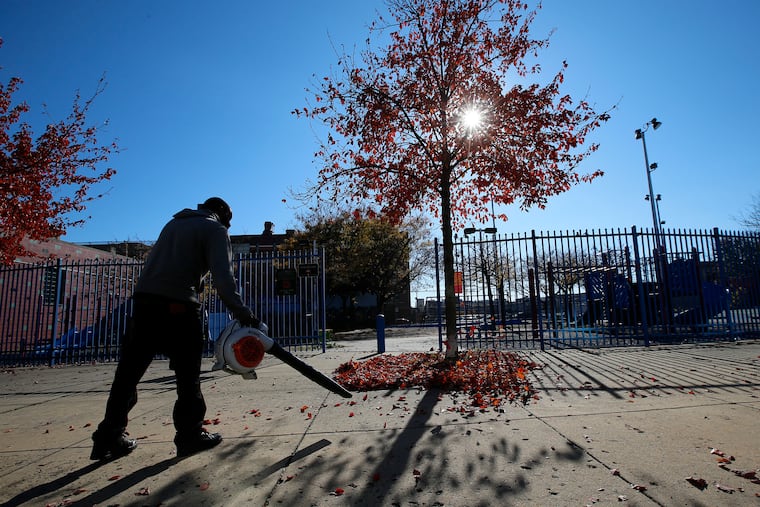Lower Merion is one step closer to banning gas-powered leaf blowers.
During an Oct. 8 committee meeting, township commissioners moved forward a preliminary proposal that would phase out gas-powered leaf blowers, beginning with a seasonal ban in 2026 that would transition into an all-out ban by 2029.
In a public hearing that stretched for more than three hours, residents largely expressed support for the proposal, citing noise and pollution from gas-powered leaf blowers that disturbs the peace and exacerbates health problems like asthma and hearing loss. Yet a small contingent of landscapers pushed back, calling the proposal an “unfunded mandate” and that would destabilize local landscaping businesses.
The proposed ordinance would ban gas-powered leaf blowers from Jan. 1 to March 1 and May 1 to Oct. 1, beginning in 2026. Starting in 2028, the township would only allow gas-powered leaf blowers during the fall. In 2029, an all-out ban would take effect.
Enforcement would be complaint-based. Violators would first get a warning, then a $100 fine for a second offense, $250 for a third offense, and $600 for a fourth or subsequent offense. The ordinance would also restrict the use of portable generators to power electric blowers and would require retailers that sell leaf blowers to post clear signage about the ordinance for two years after it goes into effect.
“The purpose of the ordinance is to reduce air pollution, persistent noise, and health impacts for people who live and work in Lower Merion Township,” said Paloma Vila, sustainability manager for the township. “Residents have been vocal over the years about the nuisance that gas-powered leaf blowers cause and the data support real environmental and health harms. This ordinance is designed to address those concerns in a balanced and practical way.”
Vila said township staff reviewed environmental research, interviewed landscaping companies, tested equipment, and spoke to peer communities that implemented similar rules ahead of last week’s meeting.
The commissioners will vote on whether to advertise the ordinance at their Oct. 22 meeting. If they vote in favor of advertising it, it will likely go to the Nov. 19 meeting for approval.
Kate Cronin, a Wynnewood resident, said gas-powered leaf blowers have “taken over” her neighborhood since she moved in, making it “awful” to be outside much of the summer.
Julia Newman said that while she and her family do everything they can to protect her asthmatic son, emissions from gas-powered leaf blowers are a regular struggle.
“It is so frustrating that the moment that he walks outside, he encounters secondhand exhaust from these machines, and there is nothing that we can do about it,” Newman said.
Testifying against the proposed ordinance, Joel Nyzio, owner of the Lafayette Hill-based All Seasons Maintenance and Design, said the ordinance would disrupt his company’s active contracts and represent a “direct interference” with the financial viability of small businesses.
Gerhart Arndt of Sustainable Lawn Care Services said his company has “thousands of dollars of paper weights, at this point,” referencing electric leaf blower batteries, which he said are expensive and have short life spans.
Though the commissioners acknowledged the potential financial burden, many said the price was worth paying for a cleaner, safer environment.
“Even if [the costs are] somewhat higher, we should accept that in the service of the health benefits, the environmental benefits, and the quality-of-life benefits,” said Todd Sinai, president of the board of commissioners.
Commissioner Gilda Kramer called the ordinance “one of the most impactful efforts that we can make to address climate change.”
Commissioners floated the idea of a buy-back or rebate program for owners of gas-powered leaf blowers to help offset the costs of the transition to electric.
More than 200 municipalities and a handful of states have banned or restricted gas-powered leaf blowers or provided incentives for people to switch to greener alternatives. Montgomery County, Md. banned gas-powered leaf blowers, as did White Plains, N.Y., a city of about 60,000 residents north of New York City. The city of Philadelphia is considering a similar ban.
This suburban content is produced with support from the Leslie Miller and Richard Worley Foundation and The Lenfest Institute for Journalism. Editorial content is created independently of the project donors. Gifts to support The Inquirer’s high-impact journalism can be made at inquirer.com/donate. A list of Lenfest Institute donors can be found at lenfestinstitute.org/supporters.

